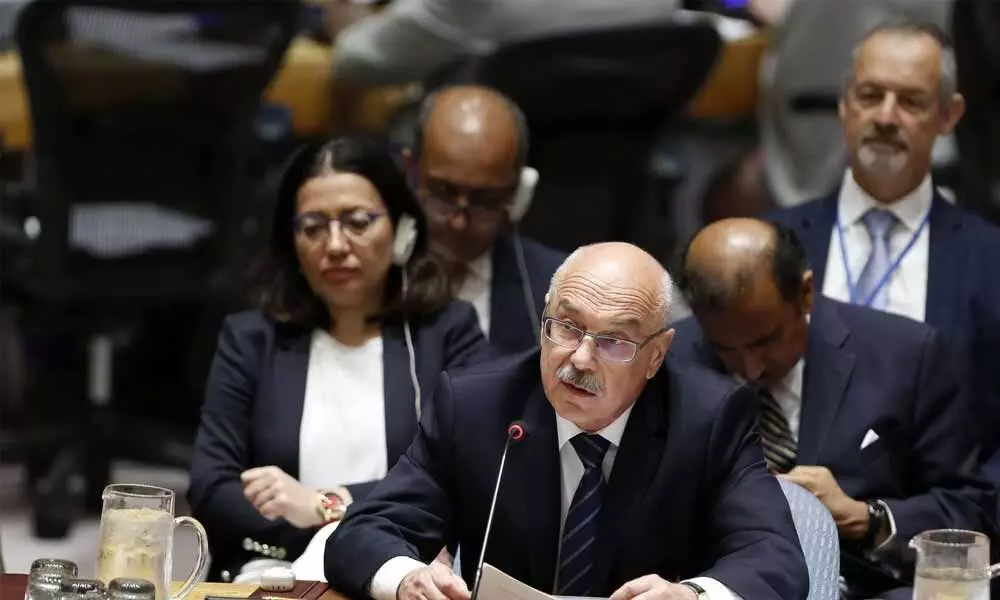Live
- ‘Bachhala Malli’ trailer heightens anticipation
- Karnataka quota row: Backward Class forum chief warns Lingayat seer over 'tinkering with reservations'
- Tight security arrangements at Group-II examination centers District SP
- Alia Bhatt captures attention in white
- Varun Dhawan talks about ‘Baby John’
- ‘Moonwalk’ trailer promises a quirky heist, love, and loyalty
- Combat leaf spot disease
- Ahsaas Channaopens up about her complex character in ‘Mismatched 3’
- Radhika Apte welcomes first child, shares heartfelt post
- Jacqueline dazzles at Da-Bangg Reloaded concert
Just In
Coronavirus brings new challenges to counter-terrorism efforts: UN


Coronavirus brings new challenges to counter-terrorism efforts: UN (Photo/IANS)
A top UN official has called for attention to new challenges brought by the global coronavirus pandemic to counter-terrorism efforts.
United Nations: A top UN official has called for attention to new challenges brought by the global coronavirus pandemic to counter-terrorism efforts.
"This pandemic environment raises several strategic and practical challenges for counter-terrorism," Undersecretary-General for UN Counter-Terrorism Office, Vladimir Voronkov told the Security Council on Monday.
The Islamic State (IS) and other terrorist groups seek to exploit the far-reaching disruption and negative socio-economic and political impacts of the pandemic, Xinhua news agency quoted Voronkov as saying.
Strengthening collective action and international counter-terrorism cooperation must remain a priority during and after the pandemic, he added.
Since the start of the year, there have seen contrasting regional disparities in the threat trajectory. In conflict zones, the threat has increased, as evidenced by the IS regrouping and increasing activity in Iraq and Syria.
In non-conflict zones, the threat appears to have decreased in the short term. Measures to minimize the spread of COVID-19, such as lockdowns and restrictions on movement, seem to have reduced the risk of terrorist attacks in many countries, said Voronkov.
Yet, there is a continued trend of attacks by individuals inspired online and acting alone or in small groups, which could be fueled by the IS opportunistic propaganda efforts during the Covid-19 crisis, he warned.
The pandemic's impact on recruitment and fundraising activities remains unclear, as its socio-economic fallout could exacerbate conditions conducive to terrorism and increase the medium- to long-term threat, both within and outside conflict zones, he said.
Voronkov also briefed the council on some developments in different regions concerning the IS.
In the Middle East, he said, the IS core has continued to consolidate its position in some areas previously under its control, operating increasingly confidently and openly.
More than 10,000 IS fighters are estimated to remain active in Iraq and Syria. There has been a significant increase in IS attacks in both countries in 2020 compared to 2019, he said.
Although the IS has only a few hundred fighters in Libya, it has been exploiting local tensions between ethnic groups.
It represents a potent threat capable of broader regional impact. The risk of escalation of the conflict in Libya could allow the IS to expand its activity, he warned.
In Asia, the IS affiliate in Afghanistan remains capable of high-profile attacks in various parts of the country despite continued territorial losses and the arrest of its leaders.
In Europe, the threat continues to come mainly from Internet-driven, homegrown terrorist radicalization, said Voronkov..

© 2024 Hyderabad Media House Limited/The Hans India. All rights reserved. Powered by hocalwire.com






